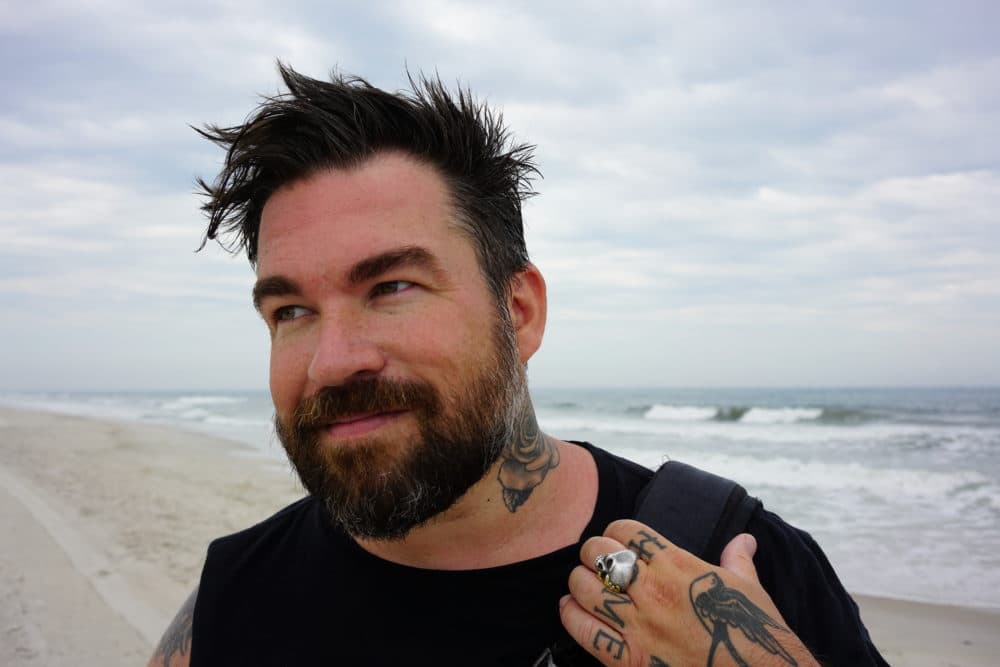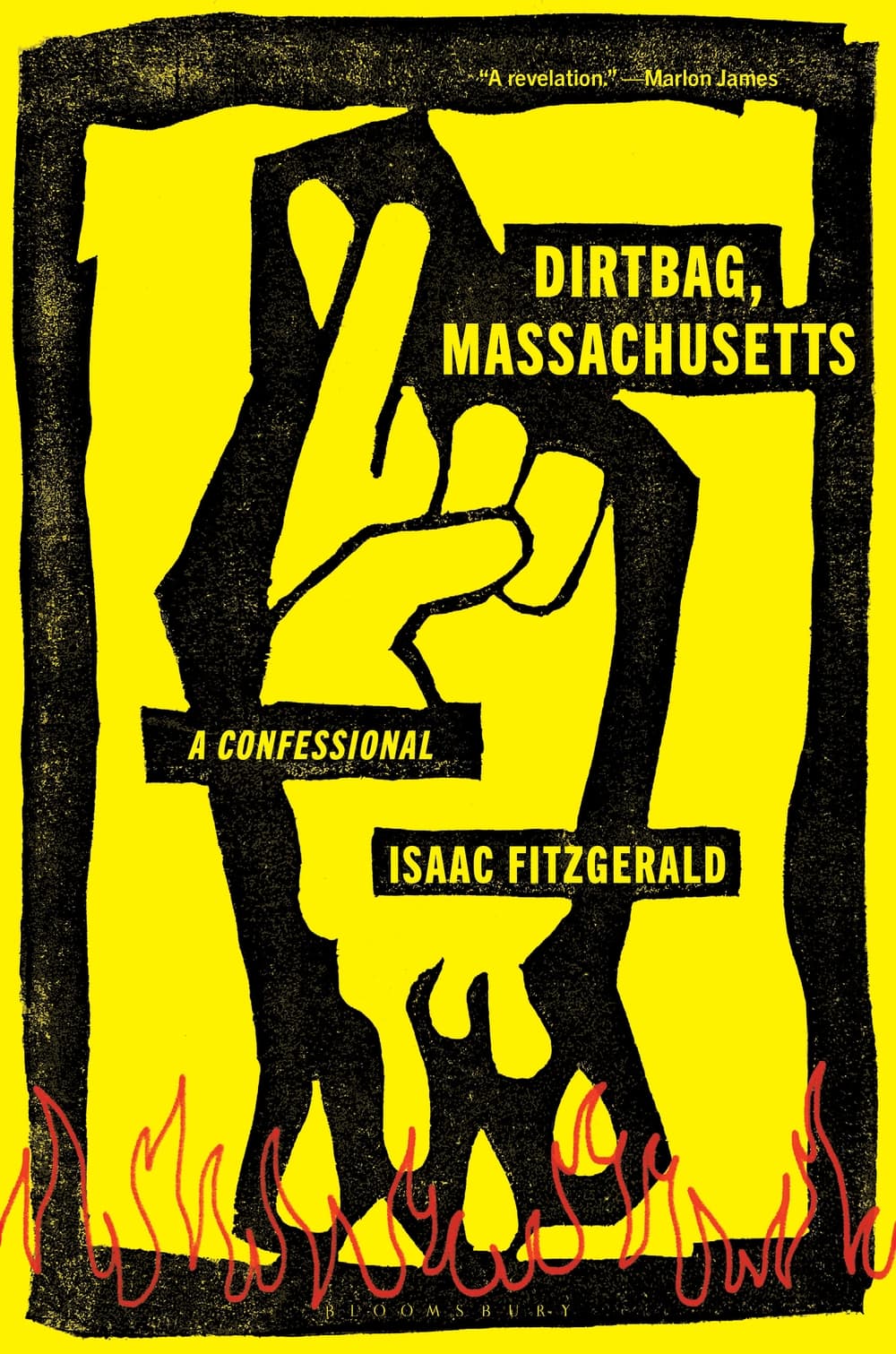Advertisement
Isaac Fitzgerald writes about finding safety and home when his own home felt unsafe in memoir 'Dirtbag, Massachusetts'

Editor's note: This segment was rebroadcast on Nov. 24, 2023. Click here for that audio.
Issac Fitzgerald is known for both his popular Substack newsletter and bright personality as he shares book recommendations on “The Today Show.”
But what’s not immediately apparent about Fitzgerald is he was someone who snorted Adderall as a kid and grew up in a Catholic shelter after his parents became homeless.
Growing up, Fitzgerald’s father beat him while his mother often leaned on him after attempting suicide. As a young adult, he worked in bars and acted in the porn industry.
It’s these stories Fitzgerald has combined into a spellbinding memoir. “Dirtbag, Massachusetts” will be released on July 19 and chronicles Fitzgerald’s life, finding community and safety in unlikely places.
“This is a story that I've been hoping to get down on the page for years,” Fitzgerald says. “Knowing that this might be my one shot at it, I didn't want to leave anything out.”
On living in a homeless shelter and his mother, who told him she wanted to abort him when he was 8 years old:
“That's a tough thing to hear at any age, but especially when you're 8 years old. And that was very much a story of a woman who was having a very hard time in her life, and she didn't have boundaries and also maybe didn't have the support to know that she probably shouldn't, in that moment, be leaning on an 8-year-old.
“So my happiest memories of my childhood were when we were in Boston, ourselves unhoused, while also supporting other people in that community. It was such an incredible experience and I met so many wonderful people. Out there, in what I call north Central Massachusetts, things were very desolate and they were very hard. And so me and my mother had a very close but very hard relationship for a very long time.”
On attending boarding school as a teenager:
“I had never been on a plane. I hadn't traveled much at all. I barely left the state. And all of a sudden, I was at this boarding school with people, not just from all over the country, but from all over the world. And I went in with such a chip on my shoulder. And don't get me wrong, I learned how to act different than myself. A story that's actually not in the book is that I went in there with a very hard Boston accent freshman year. I felt like it made me sound ignorant. So I sat in my dorm room and I started to pronounce my R's… I still have the R’s in the wrong spot, but I learned how to pronounce my R’s.
“The next year I was 14 years old. The very next year, [I was] fifteen, ‘Good Will Hunting’ comes out. All of a sudden, all of the kids are faking a Boston accent. It was ridiculous. I couldn't believe it. But anyhow, I'm just trying to say that I learned how to act of a certain role.
“But the most important thing that came to me, I walked in with such a chip on my shoulder, so much pride in my working-class background, and I still have that. But through that school, I got to learn that, you know what? Of course, there are jerks who are rich, but some of those students were so kind to me…some of my friends [are] still absolutely wonderful people and I love them. But there are other people [where I realized], ‘Oh wait, maybe your closed-minded views aren't what I agree with.’ And so boarding school really blew open this opportunity for me that I don't think I would have otherwise gotten and I feel really lucky for that.”
Advertisement
On gravitating towards bars and the porn industry as a young adult:
“Shout out to Dr. Jenny Kaufmann. She's incredible. She's my therapist. She's like, ‘Look at home and church. These spaces that were maybe supposed to be considered, and usually are averagely considered, very safe were actually very difficult places for you.’ So [I was] drawn to edgier areas.
“But what I found there, which I didn't find in my structured church or in my home life, was community. And the community and bonds and chosen family that I found within these bars in San Francisco really moved me and really made me realize as long as you find people that are willing to be loving, that are willing to be caring and are willing to not be so judgmental… you can really grow into the person that you're supposed to be. And that is where I really found that.”
On struggling with suicide and body image:
“I think it's something that I struggled with constantly. I love life. I learned how to put on a mask, and it's all mixed up in going to boarding school. Figuring out how to present differently in different aspects of my life, I learned how to wear this mask to operate. And what I've been able to do through therapy and through talking and through connecting with people who have stories similar to mine.
“That's what I hope this book is for other people, seeing my own story reflected in other people's stories. I've been able to make peace with this and maybe realize I don't need to be wearing this mask and finding that genuine joy in life. Because I do feel very lucky to be alive. I feel exuberantly happy. Don't get me wrong, they're the dark [days] too. But life is such a blessing and it makes me really thrilled that I get to participate and that I didn't mess it up early on.”
On forgiving his parents:
“My siblings: one of my brothers is my mother's child, and my sister [is] my father's child. They're incredibly loving, incredibly talented, incredibly smart individuals. And they're raising beautiful families of their own. They, at first, were a little wary of it, but it turns out my parents are some of the world's best grandparents. They might have really fumbled as parents, but they are incredible at showing up for these young children that are in their life now. It's almost like watching them get a second chance. So that's been an incredible thing to watch as this family comes back together.
“I'm not going to give away too much here, but the end, it's important to me that this doesn't read like a perfect present that's all wrapped up with a bow on the top. It's still an ongoing conversation. But what I'm happy about is that those conversations are happening. My parents have the book. My mother finished it and she wrote me an email. It just said, ‘I'm so, so sorry.’ And she went on to say, ‘I didn't know you were carrying this.’ And now we're having the conversations that we shouldn't have been having when I was eight, but we maybe could have been having when I'm 30 and we're having them now as I approach 40. And I'm so grateful.”
On the impact the band The Hold Steady had on him as a child:
“When you're young and you're having these moments, you don't know that they're unique. Maybe this is how all of life is. Then you get to a certain age you realize, ‘Wait, maybe this was really screwed up.’ Then you find the art where you see your own story reflected back on you, and that makes you feel less alone. And for me, that was the music of The Hold Steady.”

Emiko Tamagawa produced and edited this interview for broadcast with Todd Mundt. Jeannette Muhammad adapted it for the web.
Book excerpt: 'Dirtbag, Massachusetts'
By Isaac Fitzgerald
Excerpted from 'Dirtbag, Massachusetts' Copyright (c) 2022 by Isaac Fitzgerald. Used with permission of the publisher, Bloomsbury Publishing. All rights reserved.
This segment aired on July 14, 2022.

